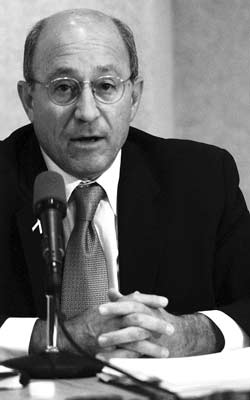Take Three on Tranquillon Ridge
PXP Hopes Third Time the Charm in Push for Offshore Oil Project
The latest twist in the saga of the Tranquillon Ridge offshore drilling project finds the oil company behind the plan shopping a new poll to pols that shows-surprise, surprise-overwhelming public support for the proposal. Houston-based PXP already has suffered two political defeats in its bid for a lease to drill in state waters from Platform Irene, off the northern Santa Barbara County coast. PXP lost at the State Lands Commission in January and in the Assembly in July, but clearly aren’t giving up on the controversial project, as demonstrated by a new round of maneuvers, machinations, and political intrigue in Sacramento.

PXP last week e-blasted a summary sheet of the alleged findings of a statewide survey it commissioned, which claimed “66 percent : of California voters favor the T-Ridge project.” At the same time, Assembly minority leader Sam Blakeslee (R-San Luis Obispo) resurrected legislation to authorize the lease, using what is called a “gut and amend” move; that’s Sacramento-speak for grabbing a pending bill, which typically is going nowhere, removing all of its language and substituting the text of the new measure, bypassing pesky procedures for actually introducing a bill.
Not surprisingly, these moves quickly caught the attention of Assemblymember Pedro Nava (D-Santa Barbara), whose Ahab-like avocation is to kill the project. While disclosing Blakeslee’s scheme, he also demanded that PXP produce the actual data behind the poll purporting to show Californians of all stripes tossing rose petals in the oil company’s path. “It’s obvious to me they don’t intend to release the poll data, which would allow an informed decision on the issue,” Nava said in a telephone interview. “They intend to continue to mislead us.”

At first glance, Nava’s desire to see the numbers and analysis behind the PXP poll ranks up there on the interesting pastime list with a fervent wish to hear Mayor Marty Blum read the phone book. As a political matter, however, it points to how the methodology of even the most scientific polling can be manipulated to shape public opinion and construct marketing narratives that influence policy debates.
For example, without seeing PXP’s data, it’s impossible to know the precise and complete language of the questions posed to those surveyed. It’s likely poll respondents were “educated” about the project with very favorable descriptions of it before being asked their opinions. Nava mocked the practice in a statement that demanded to know if the company had asked this question: “Would you support new offshore oil drilling if it meant the increased risk of larger and more severe oil spills as documented in Santa Barbara County environmental review documents?”
PXP answered with resounding silence.
The T-Ridge deal originally was negotiated by Environmental Defense Center lawyers representing regional coastal protection groups; it included PXP promises to permanently shut down drilling off Irene and three other platforms in federal waters in 14 years, in exchange for the right to slant drill into state waters for that period. The company also agreed to make other environmental concessions.
But the Lands Commission voted it down, so Gov. Arnold Schwarzenegger tried to end-run the panel by resurrecting the plan in the Legislature. At that point, EDC joined the opposition of other environmental groups; while still supporting the deal’s substance, EDC felt the governor’s move would set a dangerous precedent usurping the Lands Commission, often a strong voice for coastal protection. When the debate moved to the Legislature, however, such complexity and nuance were long gone; the fight boiled down to offshore drilling-for or against.
GOP leader Blakeslee now seeks to give PXP another bite at the apple. Unlike the earlier bill, defeated by Nava and most Democrats in the Assembly, the new version identifies state programs that would benefit from a $100-million annual royalty from PXP, a way to sweeten the pot for lawmakers who might be persuaded to change their mind. The current legislative session ends this week, so it seems likely his measure will carry over into next year.
There is speculation that PXP may try to pass T-Ridge as a ballot initiative, a strategy that would carry some political risk. A campaign about offshore drilling could draw widespread attention to the fact that oil companies do not pay a severance tax in California, unlike every other oil-producing state. Several legislators, including Nava, are sponsoring legislation to impose such a tax, which could generate $1.5 billion or more for the state.
“If they go to the ballot,” he predicted, “they’ll create support for a severance tax.” Lock up the kids, Maude, this one’s just starting.



